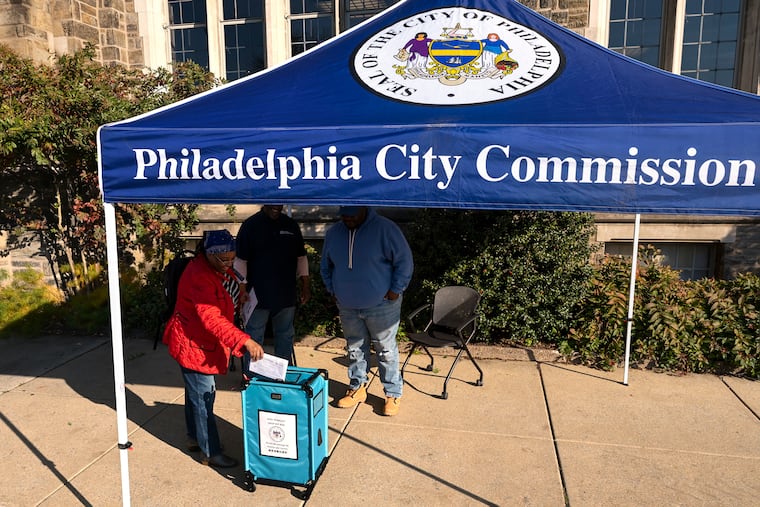Pennsylvania Commonwealth Court rules that counties can’t reject undated mail ballots
The ruling was a victory for voting rights groups, which have fought against the requirement for years, and makes it slightly easier for Pennsylvanians to vote by mail in November.

Pennsylvania election officials can no longer reject otherwise valid mail ballots simply because voters failed to date or put the wrong date on the outer envelope, the Commonwealth Court ruled Friday.
In a 4-1 ruling, a panel of the court’s judges concluded that provisions in state law requiring voters to hand-date their envelopes served no compelling governmental purpose because elections administrators do not use those dates to determine whether a vote was cast on time. Instead, they rely on when the ballot was received and scanned into the state’s mail-ballot tracking system.
Therefore, the panel ruled, allowing ballots to be rejected for missing or incorrect dates infringes upon the voting rights of Pennsylvanians protected under Free and Equal Elections Clause of the state constitution.
“The refusal to count undated or incorrectly dated but timely mail ballots submitted by otherwise eligible voters because of meaningless and inconsequential paperwork errors violates the fundamental right to vote,” Judge Ellen Ceisler wrote for the majority.
Friday’s ruling marks a significant victory for voting rights groups, which have fought against the requirement for years, and makes it slightly easier for Pennsylvanians to vote by mail in November and know their ballots will count.
“As the birthplace of modern democracy, Pennsylvania has a long tradition of free and equal elections, and today’s decision adds to that legacy,” Brent Landau, the executive director of the Public Interest Law Center, one of the groups that had challenged the requirement, said in a statement Friday.
But rules around mail ballots remain highly fraught in the critical swing state, and the Pennsylvania GOP and Republican National Committee, which both intervened in the case to defend the requirement, vowed an immediate appeal to the state Supreme Court.
“Today’s decision … was an example of the worst kind of judicial activism,” Claire Zunk, a spokesperson for the RNC, said in a statement. “Courts should not undermine election confidence and integrity by striking down common sense election laws enacted by the people’s representatives.”
They found some support in a fiery dissent from Judge Patricia McCullough — the lone judge on the Commonwealth Court panel that heard the case to back the dating requirement. She accused her colleagues of “discard[ing] their judicial robes and don[ning] legislative hats” to rewrite election law and effectively usurp the role of state lawmakers.
“Adherence to … the separation of powers is especially important in the politically-charged and highly partisan atmosphere in which we now live and work,” she wrote. “Exceeding our function as impartial arbiters of the constitution, and rewriting legislation to keep up with the times does little to reinforce trust and respect for the Commonwealth’s system of justice.”
The American Civil Liberties Union and Public Interest Law Center filed the lawsuit in May against Pennsylvania Secretary of State Al Schmidt and the Boards of Election in Philadelphia and Allegheny Counties. They contended the requirement for voters to write a date on mail ballots was meaningless and that voters were being disenfranchised if their ballots were tossed over that error.
A similar lawsuit, arguing the requirement violates the federal Voting Rights act, is working its way through federal court.
In a post on X, Gov. Josh Shapiro called the ruling a “victory for Pennsylvanians’ fundamental right to vote.”
“This ruling makes clear a voter’s minor error of forgetting to date or misdating a ballot envelope cannot be a cause for disenfranchisement,” a spokesperson for the Pennsylvania Department of State said in an email. “Our Administration will always uphold Pennsylvanians’ right to vote and is pleased with today’s ruling.”
All three of Philadelphia’s commissioners who oversee elections celebrated the decision, but some said more needed to be done to ensure ballots also wouldn’t be tossed out for lacking a secrecy envelope — another common error made by voters who cast their ballots by mail.
“I’m happy about it, I’m certainly not ready to ring any victory bells or run a victory lap because we know most assuredly it’ll go up on appeal,” commissioner Lisa Deeley said.
Under the 2019 law that authorized no-excuse mail voting in Pennsylvania, voters must sign and date their ballots and place them it in a privacy envelope to be counted.
State and local officials had sought to minimize the number of ballots rejected in the April primary through newly designed envelopes that filled out part of the date for voters, leaving them to finish the rest.
But the envelopes did not fully solve the problem. In Philadelphia, more than 400 ballots were rejected in the primary election because they were undated or incorrectly dated. Statewide, nearly 8,000 ballots were rejected for issues with the date, signature or privacy envelope.